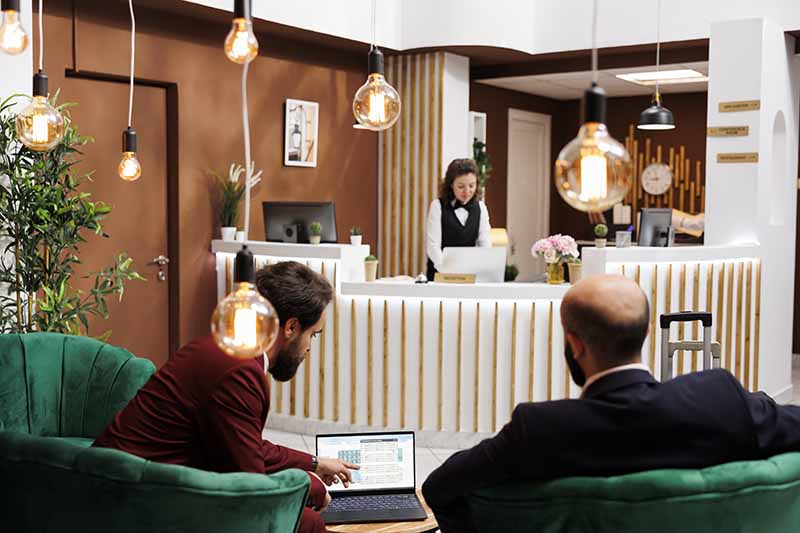
Times are changing. Here are 10 ways traditional hoteliers are harnessing modern technology to enhance guest experience.
There’s a lot of innovation happening in the hospitality world lately. It was said many times a few years ago that the pandemic accelerated tech adoption in the sector at the rate of “decades in days.” And after a period of upheaval, we’re now seeing a period of growth and adjustment in many areas of the world.
In a report titled Technology in Hospitality: 20 Trends Shaping the Industry by Hotel Tech Report, Jordan Hollander recently wrote: “With so much change in the sector, it can be difficult to decide what new software to purchase or where to allocate budget. Although the industry changes rapidly, it’s clear that a few key trends are driving hotels forward.”
We pulled several highlights from this report and added a few that should also be on the radar. Some of these were accelerated by the pandemic and others by different factors, but all are changing the game and likely here to stay.
Renewable energy
Hoteliers committed to reducing their environmental impact are adopting various eco-friendly strategies. These include the installation of solar panels, transitioning to energy-efficient lighting, and utilizing thermal heat pumps. Some hotels are even approaching or achieving net-zero and carbon-neutral status, room2 in Chiswick, London, and the Four Elements Hotel in Amsterdam.
Online & mobile booking
Hoteliers have been leveraging online and mobile booking to enhance the efficiency and convenience of the reservation process with user-friendly websites and mobile apps for some time now. More recently, hotels and resorts are also using these systems to book and manage spa and other ancillary revenue offerings like workshops and classes, tennis and pickleball courts, cabanas, and more. These systems can integrate with a hotel’s property management system (PMS), allowing for a more streamlined guest experience.
Contactless check-in and checkout & touchless payments
Contactless check-in and checkout, using mobile apps and self-service kiosks for quick ID scanning and room key dispensing, streamline processes for both guests and hoteliers. This efficient approach also applies to spas and other hotel services. The added convenience of paying through digital wallets and mobile payments enhances the guest experience, saves time, reduces lineups, and decreases the need for front desk staff.
Digital tipping
Fewer guests are carrying cash and it’s the housekeepers and valets who have been paying the price. Fortunately, properties are adopting digital tipping apps that allow guests to leave tips through digital payment methods that work with QR codes or links through which guests can access the payment platform which then handles the tip out.
Artificial Intelligence (A.I.)
AI is gaining traction in the hotel industry, aiding hoteliers in enhancing guest satisfaction, maximizing revenue, and reducing costs. AI-driven hotel software systems can offer rate suggestions, forecast demand, roll out promotions, manage staff scheduling, handle concierge tasks, and more.
Cloud computing
Hotel software has evolved from being installed on local hard drives to cloud-based solutions, recognized for their numerous advantages. Today’s cloud software enhances convenience and flexibility, supporting remote work, offering real-time updates, and reducing costs and space requirements. It also enhances data security and collaboration, contributing to increased guest satisfaction.
Tapping data & analytics
Hotel systems, along with their ancillary revenue departments, accumulate extensive data, such as reservation details, purchase history, and email interactions. Hoteliers are utilizing diverse software solutions to leverage this data for multiple purposes. This includes personalizing services, enhancing customer relationship management, optimizing yield management, conducting targeted marketing, and refining services and amenities.
Mobile keys
Smartphones equipped with secure Bluetooth technology enable guests to use mobile keys to unlock their rooms, offering a more reliable solution than traditional plastic key cards, which are easier to lose or demagnetize.
Mobile guest journeys
Hoteliers are focusing on fostering guest relationships beyond the duration of their stay. For example, with mobile or web-based apps for booking restaurant or spa reservations and exploring hotel amenities. Ancillary revenue management software, integrated with guest-facing apps like Intelity or OKAMMI, simplifies this process. The guest journey is further enhanced with personalized recommendations, pre-stay reminders, mid-stay check-ins, and post-visit follow-ups and surveys.
Yield management
Hotels have been using yield management for rooms for some time and now this is expanding to include yield for spa and ancillary revenue departments. By understanding and capitalizing on the patterns in your data, businesses are boosting revenue potential, approaching maximum capacity utilization, and enhancing the overall customer experience at spas and for other ancillary revenue streams.
The hospitality industry is embracing a new era of technology, driven by recent global events and the evolving needs of modern travelers. This technological renaissance is not just about surviving the current landscape but thriving in it, providing guests with unprecedented levels of convenience, personalization, and eco-friendly options. The industry’s commitment to innovation promises a future where travel and hospitality are not only more efficient and sustainable but also more attuned to the desires and values of every guest.
To read the full list of 20 Trends Shaping the Industry in 2024 visit Hotel Tech Report.
Image by DCStudio on Freepik



